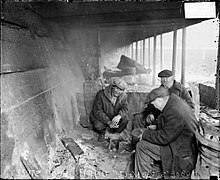Hobo
A hobo is a North American migrant worker . Hobos are mostly homeless and use freight trains to travel across the country and earn something here and there with smaller jobs.
The heyday of the hobos was the late 19th and early 20th centuries. In times of economic crisis, after wars and especially during the Great Depression , their number increased sharply. In Britt (Iowa) there is a single Hobo cemetery and a Hobo Museum.
etymology
The origin of the word is unclear, there are various, unverified theories about it.
Famous hobos
In a ballad that is still known today, the migrant worker and labor leader Joe Hill (1875–1915) is celebrated. Another hobo who later became famous was the writer Jack London , who toured large parts of the United States and Canada from 1893–1894 . Another famous former hobo is the American blues musician Seasick Steve , whose songs often deal with his hobo days. Also Elmore James was a short period of his life as a hobo on the go. The avant-garde musician Harry Partch also lived as a hobo for almost ten years and wrote about it in 1943 his work US Highball - A Musical Account of Slim's Transcontinental Hobo Trip . Another well-known hobo is the country musician Boxcar Willie . Goebel Reeves lived as a hobo for many years and was best known for his Hobo's Lullaby . The author and former professional burglar Jack Black (1868–1933) was also a hobo, and Jacque Fresco (1916–2017) was also a hobo around 1930.
Hobos in culture
Hobos are the subject of many feature films and music:
- Wild Boys of the Road (1933) by William A. Wellman
- Sullivan's Travels (1941) by Preston Sturges
- The Sea Wolf (Part 2) (1971) after Jack London
- A train for two scoundrels (originally: Emperor of the North ) (1973) by Robert Aldrich
- Hard Times (1975) by Walter Hill , with Charles Bronson and James Coburn in the lead role
- Life Stinks (1991) by Mel Brooks , who also stars
- The Champ (2007) by Rod Lurie
- Kit Kittredge: An American Girl (2008) by Patricia Rozema
- Song Like a Hobo (2009) by Charlie Winston
- Hobo with a Shotgun (2011) by Jason Eisener with Rutger Hauer in the lead role.
See also
literature
- Jgnaz Civelli-Battal: ... and whoever is a hobo is a king. In its prime, there were two million rail tramps in America. In: Frankfurter Allgemeine Zeitung , 85, 1996, April 11, 1996, p. R5.
- Jack London: Adventurer of the rail line dtv 948. Unabridged, 8th edition, Deutscher Taschenbuchverlag , Munich 1984, ISBN 3-423-00948-9 .
-
Nels Anderson : The Hobo. The Sociology of the Homeless Man University of Chicago Press . Chicago IL 1923.
- Review: Hanna Meuter in: Kölner Vierteljahrshefte für Soziologie Vol. 3, 1923/24, ZDB -ID 200364-8 , p. 193 f.
- Summary: Hartmut Häußermann , Walter Siebel : Urban Sociology. An introduction to the Campus, Frankfurt am Main et al. 2004, ISBN 3-593-37497-8 , pp. 51–52.
- Hanna Meuter: Homelessness. Their effects on behavior and group formation of people Diss. Phil. Cologne 1924 (excerpt from: Yearbook of the Philosophical Faculty, Cologne 1923/1924); Gustav Fischer, Jena 1925; Foreword by Leopold von Wiese .
- William Henry Davies: The Autobiography of a Super-Tramp Preface George Bernard Shaw . Jonathan Cape, London 1908 (reprint. Kessinger, Kila MT 2005, ISBN 0-7661-4674-X ; in German: Supertramp. Autobiography of a vagabond. From the English. Ursula von Wiese . Manesse, Zurich 1985 ISBN 3-7175- 1686-8 ).
- Michael Schulte: Wherever I am, there is nowhere . Oesch Verlag counterpoint. Zurich 2005 ISBN 3-0350-2012-4 .
- Fredy Gareis: King of the Hobos: Out and about with America's vagabonds. Malik 2018, ISBN 3-8902-9482-0 .

